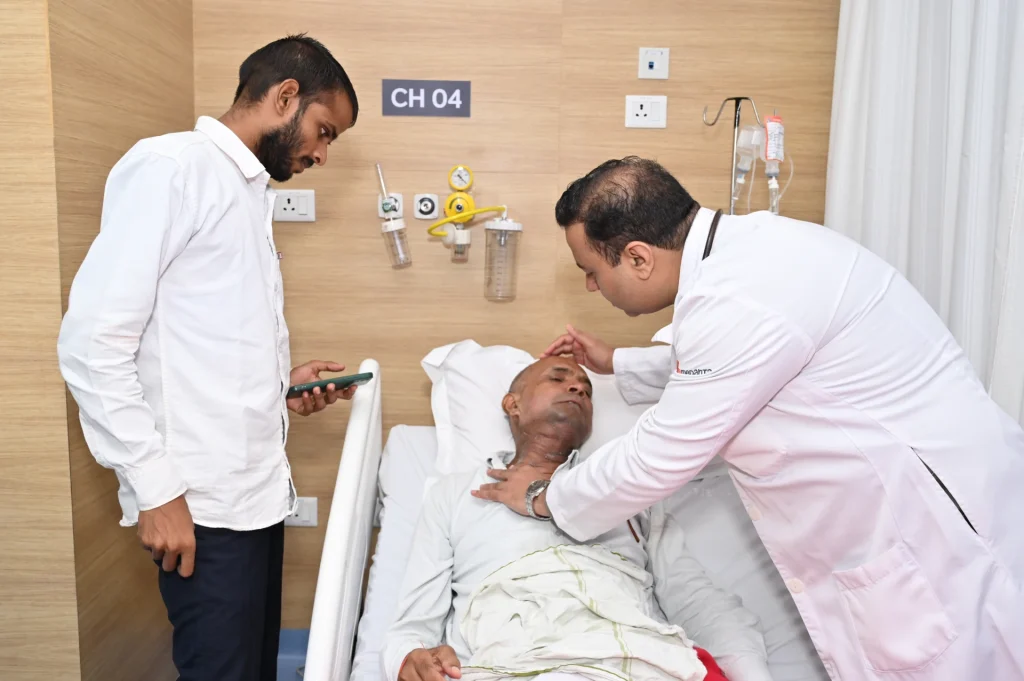- CANCER HELPLINE: 1800-22-1951
- 91 7317418888
- contact@drharshatreya.com
- CANCER HELPLINE: 1800-22-1951
carousel-slider domain was triggered too early. This is usually an indicator for some code in the plugin or theme running too early. Translations should be loaded at the init action or later. Please see Debugging in WordPress for more information. (This message was added in version 6.7.0.) in /home/locaqain/public_html/drharshatreya/wp-includes/functions.php on line 6131Gastric cancer, also known as stomach cancer, develops from the lining of the stomach and can progress to other layers and surrounding organs. It is the fifth most common cancer globally, and its symptoms often go unnoticed in the early stages, leading to later-stage diagnoses. Early detection of gastric cancer is critical for effective treatment, yet many cases are discovered after the disease has already spread.
For those diagnosed with gastric cancer, management extends beyond medical treatment. Emotional support, nutrition management, and lifestyle adjustments are essential for well-being. Specialized support services and counseling can help address the physical and emotional challenges that accompany diagnosis and treatment.

Gastric cancer, also known as stomach cancer, is a type of cancer that develops in the lining of the stomach. It occurs when cells in the stomach grow uncontrollably, forming a tumor. While gastric cancer can develop in any part of the stomach, it most commonly originates in the innermost layer called the mucosa. Over time, it can invade deeper layers of the stomach wall and spread to other parts of the body, including the esophagus, small intestine, lymph nodes, liver, and lungs.
The exact causes of gastric cancer are not fully understood, but several risk factors have been identified. Infection with Helicobacter pylori (H. pylori) bacteria is a major contributor, as it can lead to chronic inflammation and ulcers, increasing the risk of cancer development. Other risk factors include a diet high in salty and smoked foods, low intake of fruits and vegetables, smoking, excessive alcohol consumption, obesity, family history of gastric cancer, and certain genetic mutations. Gastric cancer is more common in older adults, with men being at higher risk than women.
Symptoms of gastric cancer often go unnoticed in the early stages, making it challenging to detect. Initial signs may include indigestion, bloating, mild nausea, and loss of appetite. As the disease progresses, more severe symptoms such as unexplained weight loss, difficulty swallowing, persistent abdominal pain, vomiting, and blood in stool or vomit may occur.
Diagnosis involves various tests, including endoscopy, where a flexible tube with a camera is used to examine the stomach, and biopsies to analyze tissue samples. Imaging tests like CT scans and X-rays may also help assess the extent of the disease.
Accurate diagnosis is essential for effective treatment planning. Diagnostic tools and procedures for gastric cancer include:
Endoscopy: An endoscope (a thin, flexible tube with a camera) is inserted into the stomach to visualize abnormal areas and collect biopsy samples for analysis.
Biopsy: Tissue samples are examined under a microscope to confirm the presence of cancer cells.
Imaging Tests: CT scans, PET scans, and MRI help determine the extent and spread of cancer.
Barium Swallow: The patient swallows a barium solution that coats the stomach lining, making it easier to identify abnormalities on X-rays.
Staging Tests: Tests such as laparoscopy and ultrasound may be conducted to determine the cancer’s stage and whether it has spread to other parts of the body.
The treatment approach depends on the stage, location, and overall health of the patient. Options include:
Surgery: Surgery is the most effective treatment for localized gastric cancer.
Chemotherapy: Drugs are used to kill cancer cells or shrink tumors before surgery (neoadjuvant therapy) or eliminate remaining cancer cells post-surgery (adjuvant therapy).
Radiation Therapy: High-energy rays target and kill cancer cells. Radiation is often used in conjunction with chemotherapy to reduce tumor size before surgery or to target remaining cancer cells after surgery.
Targeted Therapy: Targeted drugs, such as trastuzumab for HER2-positive gastric cancer, interfere with specific molecules that drive cancer growth.
Immunotherapy: This treatment leverages the body’s immune system to target and attack cancer cells. Pembrolizumab is an example used for advanced gastric cancer with specific genetic markers.
© 2024 Harshvardhan Atreya. All Rights Reserved.